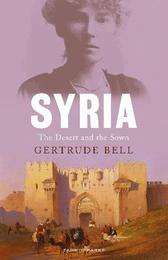
|
Syria: The Desert and the Sown
Paperback / softback
Main Details
| Title |
Syria: The Desert and the Sown
|
| Authors and Contributors |
By (author) Gertrude Bell
|
| Physical Properties |
| Format:Paperback / softback | | Pages:352 | | Dimensions(mm): Height 198,Width 129 |
|
| Category/Genre | Classic travel writing |
|---|
| ISBN/Barcode |
9781838602307
|
| Classifications | Dewey:915.691043 |
|---|
| Audience | |
|---|
|
Publishing Details |
| Publisher |
Bloomsbury Publishing PLC
|
| Imprint |
Bloomsbury Publishing PLC
|
| Publication Date |
13 June 2019 |
| Publication Country |
United Kingdom
|
Description
'You may rely upon one thing - I'll never engage in creating kings again; it's too great a strain.' Gertrude Bell - traveller, scholar, archaeologist, spy - was one of the most powerful figures in the Middle East in the 20th century. With T.E. Lawrence, she was a significant force behind the Arab Revolt and was responsible for creating the boundaries of the modern state of Iraq, as well as installing the Hashemite dynasty, with Faisal I as king, in Iraq and Transjordan. Her knowledge of the Arab world was forged through decades of travel and the relationships she built across Arabia with tribal leaders and kings, who referred to her as Umm al Mu'mineen, or Mother of the Faithful. In the winter of 1906, she undertook an often-dangerous journey through Greater Syria - Damascus, Jerusalem, Beirut, Antioch and Alexandretta - and her portrait of the landscapes, people and customs of a part of the world that very few had explored at the time is now a classic of travel writing. Bell's Syria illuminates a region that continues to preoccupy us today as well as portraying the unique life of a remarkable, still-controversial and ultimately tragic woman.
Author Biography
Gertrude Bell, CBE (1868-1926) was a writer, traveller, political officer, archaeologist and spy who helped forge the boundaries of the modern Middle East. Through her vivid writings, she brought the Arab world alive for countless people as she travelled to some of the region's most inhospitable places.
|